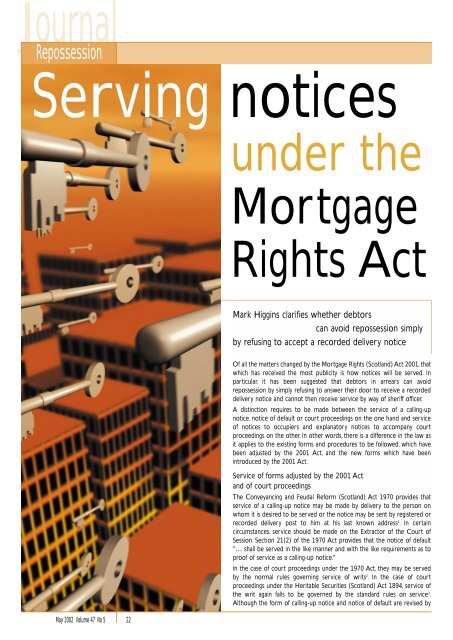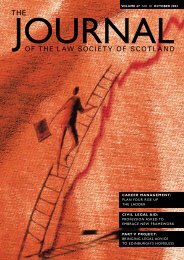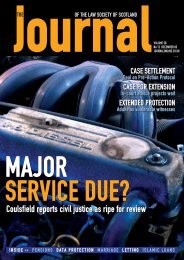OF THE LAW SOCIETY OF SCOTLAND - The Journal Online
OF THE LAW SOCIETY OF SCOTLAND - The Journal Online
OF THE LAW SOCIETY OF SCOTLAND - The Journal Online
You also want an ePaper? Increase the reach of your titles
YUMPU automatically turns print PDFs into web optimized ePapers that Google loves.
<strong>Journal</strong><br />
Repossession<br />
Serving notices<br />
under the<br />
Mortgage<br />
Rights Act<br />
May 2002 Volume 47 No 5 22<br />
Mark Higgins clarifies whether debtors<br />
can avoid repossession simply<br />
by refusing to accept a recorded delivery notice<br />
Of all the matters changed by the Mortgage Rights (Scotland) Act 2001, that<br />
which has received the most publicity is how notices will be served. In<br />
particular, it has been suggested that debtors in arrears can avoid<br />
repossession by simply refusing to answer their door to receive a recorded<br />
delivery notice and cannot then receive service by way of sheriff officer.<br />
A distinction requires to be made between the service of a calling-up<br />
notice, notice of default or court proceedings on the one hand and service<br />
of notices to occupiers and explanatory notices to accompany court<br />
proceedings on the other. In other words, there is a difference in the law as<br />
it applies to the existing forms and procedures to be followed, which have<br />
been adjusted by the 2001 Act, and the new forms which have been<br />
introduced by the 2001 Act.<br />
Service of forms adjusted by the 2001 Act<br />
and of court proceedings<br />
<strong>The</strong> Conveyancing and Feudal Reform (Scotland) Act 1970 provides that<br />
service of a calling-up notice may be made by delivery to the person on<br />
whom it is desired to be served or the notice may be sent by registered or<br />
recorded delivery post to him at his last known address1 . In certain<br />
circumstances, service should be made on the Extractor of the Court of<br />
Session. Section 21(2) of the 1970 Act provides that the notice of default<br />
“… shall be served in the like manner and with the like requirements as to<br />
proof of service as a calling-up notice.”<br />
In the case of court proceedings under the 1970 Act, they may be served<br />
by the normal rules governing service of writs2 . In the case of court<br />
proceedings under the Heritable Securities (Scotland) Act 1894, service of<br />
the writ again falls to be governed by the standard rules on service3 .<br />
Although the form of calling-up notice and notice of default are revised by










